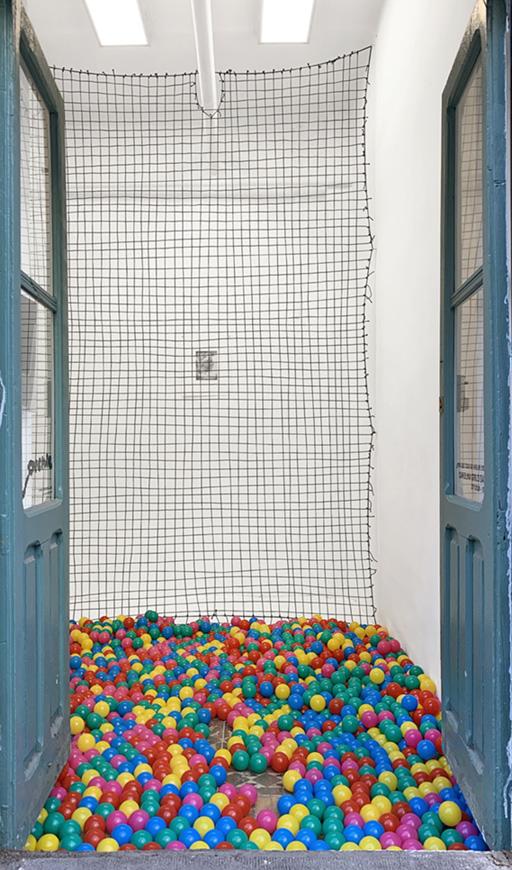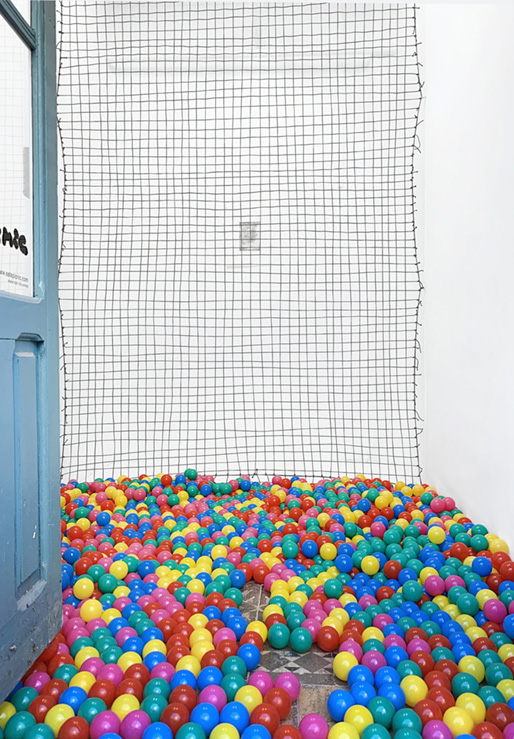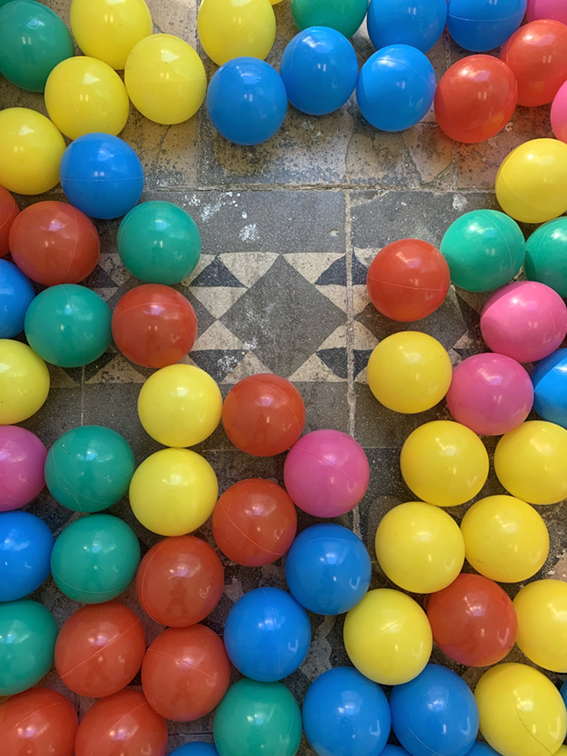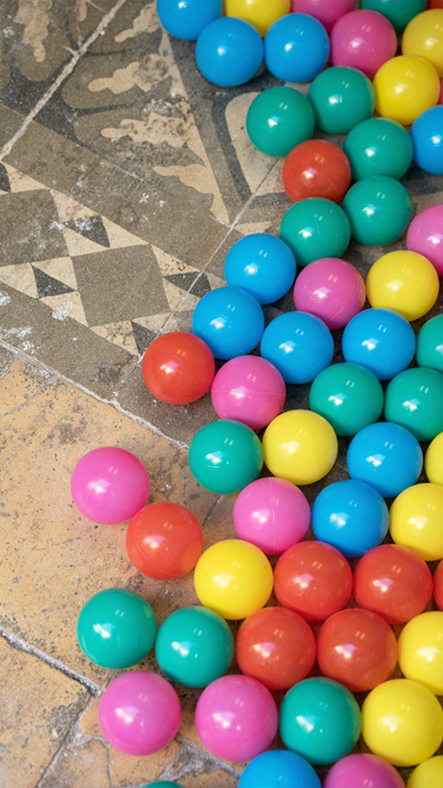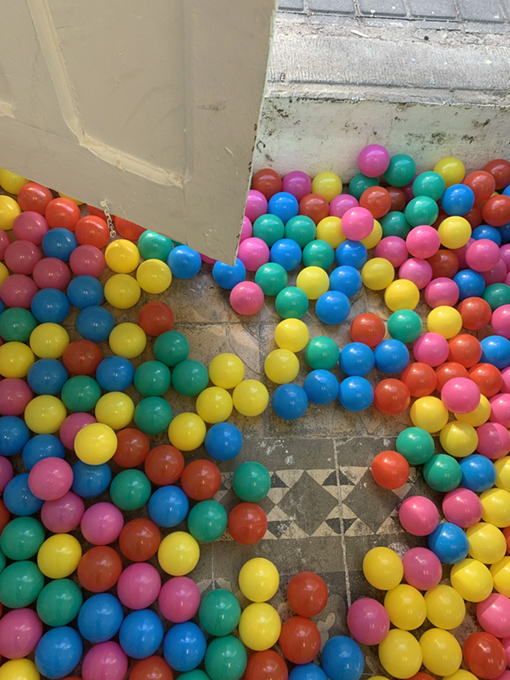"¿Por qué todo se vuelve oscuro?" es un duelo interno, un eco poético que resuena con la asincronía de la vida y la muerte.
Construyendo un laberinto de emociones, la artista invita a reflexionar sobre la incomodidad que yace en la autenticidad y el dolor, pero recordándonos que, incluso cuando todo parece oscurecerse, la verdad sigue como una luz en lo más profundo de nuestra esencia.
"¿Por qué todo se vuelve oscuro?" es la primera exposición individual de Carolina Grilo Santos en Madrid, donde busca explorar nuevas dimensiones de la ocupación física del espacio, confrontar al público con la vulnerabilidad y romper barreras de comodidad. Actualmente la artista utiliza la investigación neurocientífica y la experiencia psicoterapéutica como herramientas para explorar los mecanismos mentales, los límites de navegación y las máscaras sociales. En este viaje, Carolina Grilo Santos nos invita a cuestionar, reflexionar y explorar los matices de la vida, mientras todo a nuestro alrededor parece volverse oscuro.
Esta exposición ha contado con el apoyo de la Fundación Calouste-Gulbenkian.
Construyendo un laberinto de emociones, la artista invita a reflexionar sobre la incomodidad que yace en la autenticidad y el dolor, pero recordándonos que, incluso cuando todo parece oscurecerse, la verdad sigue como una luz en lo más profundo de nuestra esencia.
"¿Por qué todo se vuelve oscuro?" es la primera exposición individual de Carolina Grilo Santos en Madrid, donde busca explorar nuevas dimensiones de la ocupación física del espacio, confrontar al público con la vulnerabilidad y romper barreras de comodidad. Actualmente la artista utiliza la investigación neurocientífica y la experiencia psicoterapéutica como herramientas para explorar los mecanismos mentales, los límites de navegación y las máscaras sociales. En este viaje, Carolina Grilo Santos nos invita a cuestionar, reflexionar y explorar los matices de la vida, mientras todo a nuestro alrededor parece volverse oscuro.
Esta exposición ha contado con el apoyo de la Fundación Calouste-Gulbenkian.
"¿Por qué todo se vuelve tan oscuro?” (Why does everything go dark?) is an internal mourning, a poetic echo that resonates with the asynchrony of life and death.
Constructing a labyrinth of emotions, the artist invites us to reflect on the discomfort that lies in authenticity and pain, but reminding us that even when everything seems to go dark, the truth remains as a light in the depths of our essence.
"¿Por qué todo se vuelve tan oscuro?” is Carolina Grilo Santos' first solo exhibition in Madrid, where she seeks to explore new dimensions of the physical occupation of space, to confront the public with vulnerability and to break down barriers of comfort. The artist is currently using neuroscientific research and psychotherapeutic experience as tools to explore mental mechanisms, navigational limits and social masks. In this journey, Carolina Grilo Santos invites us to question, reflect and explore the nuances of life, while everything around us seems to go dark.
This exhibition was supported by the Calouste-Gulbenkian Foundation.
Constructing a labyrinth of emotions, the artist invites us to reflect on the discomfort that lies in authenticity and pain, but reminding us that even when everything seems to go dark, the truth remains as a light in the depths of our essence.
"¿Por qué todo se vuelve tan oscuro?” is Carolina Grilo Santos' first solo exhibition in Madrid, where she seeks to explore new dimensions of the physical occupation of space, to confront the public with vulnerability and to break down barriers of comfort. The artist is currently using neuroscientific research and psychotherapeutic experience as tools to explore mental mechanisms, navigational limits and social masks. In this journey, Carolina Grilo Santos invites us to question, reflect and explore the nuances of life, while everything around us seems to go dark.
This exhibition was supported by the Calouste-Gulbenkian Foundation.
Carolina Grilo Santos (1993, Aveiro) es una artista, investigadora y productora artística portuguesa residente en Oporto, dónde forma parte del colectivo Campanice. En 2019 cofundó el proyecto Paralaxe y desde ese momento es investigadora colaboradora de i2ADS.
Expone regularmente desde 2014, destacando las exposiciones individuales “by division and differentiation” (FEUP, Porto, 2023) y “how to make a fossil in a single day” (Galeria Ocupa, Porto, 2022); y las exposiciones colectivas “Extraño en una tumba guay” (Salón, Madrid, 2023), “Pissing in a River” (Galeria Nuno Centeno, Porto, 2023), “Devenir Isla - Inéditos 2022” (La Casa Encendida, Madrid, 2022), “AP21” (Aragón Park, Madrid, 2022) y “Whether the Weather” (IGUP, V.N.Gaia, 2020). También cabe destacar su selección como representante portuguesa, en 2016, para la exposición “Notes on Tomorrow - CreArt European Itinerant Exhibition”, celebrada en Kaunas (LTU), Kristiansand (NOR) y Aveiro (PT), y la realización, en 2020, de una residencia artística transatlántica Transmetatlanticus: Residência Artística Internacional Oca (asociación entre la Casa Niemeyer, BR, y Emerge, PT).
Sus obras están presentes en colecciones privadas y públicas, entre las que se destacan la adquisición de “The Complete Guide to Nothingness” por el Ayuntamiento de Oporto, en 2023. También en ese año, su primera película “by division and differentiation” fue elegida para su estreno mundial en DocLisboa y recibió el premio Pedro Fortes - Mejor Película Portuguesa de los Verdes Años.
Expone regularmente desde 2014, destacando las exposiciones individuales “by division and differentiation” (FEUP, Porto, 2023) y “how to make a fossil in a single day” (Galeria Ocupa, Porto, 2022); y las exposiciones colectivas “Extraño en una tumba guay” (Salón, Madrid, 2023), “Pissing in a River” (Galeria Nuno Centeno, Porto, 2023), “Devenir Isla - Inéditos 2022” (La Casa Encendida, Madrid, 2022), “AP21” (Aragón Park, Madrid, 2022) y “Whether the Weather” (IGUP, V.N.Gaia, 2020). También cabe destacar su selección como representante portuguesa, en 2016, para la exposición “Notes on Tomorrow - CreArt European Itinerant Exhibition”, celebrada en Kaunas (LTU), Kristiansand (NOR) y Aveiro (PT), y la realización, en 2020, de una residencia artística transatlántica Transmetatlanticus: Residência Artística Internacional Oca (asociación entre la Casa Niemeyer, BR, y Emerge, PT).
Sus obras están presentes en colecciones privadas y públicas, entre las que se destacan la adquisición de “The Complete Guide to Nothingness” por el Ayuntamiento de Oporto, en 2023. También en ese año, su primera película “by division and differentiation” fue elegida para su estreno mundial en DocLisboa y recibió el premio Pedro Fortes - Mejor Película Portuguesa de los Verdes Años.
Carolina Grilo Santos (1993, Aveiro) is a Portuguese artist, researcher and artistic producer based in Porto, where she is part of the Campanice collective. In 2019 she co-founded the project Paralaxe and since then she has been a research collaborator at i2ADS.
She has been exhibiting regularly since 2014, including the solo exhibitions "by division and differentiation" (FEUP, Porto, 2023) and "how to make a fossil in a single day" (Galeria Ocupa, Porto, 2022); and the group exhibitions "Stranger in a cool grave" (Salón, Madrid, 2023), "Pissing in a River" (Galeria Nuno Centeno, Porto, 2023), "Becoming Island - Unpublished 2022" (La Casa Encendida, Madrid, 2022), "AP21" (Aragón Park, Madrid, 2022) and "Whether the Weather" (IGUP, V. N.Gaia, 2020). Also noteworthy is her selection as Portuguese representative, in 2016, for the exhibition "Notes on Tomorrow - CreArt European Itinerant Exhibition", held in Kaunas (LTU), Kristiansand (NOR) and Aveiro (PT), and the realisation, in 2020, of a transatlantic artistic residency Transmetatlanticus: Residência Artística Internacional Oca (partnership between Casa Niemeyer, BR, and Emerge, PT).
Her works are present in private and public collections, including the acquisition of "The Complete Guide to Nothingness" by the Porto City Council in 2023. Also in that year, his first film "by division and differentiation" was chosen for its world premiere at DocLisboa and received the Pedro Fortes Award - Best Portuguese Film of the Green Years.
She has been exhibiting regularly since 2014, including the solo exhibitions "by division and differentiation" (FEUP, Porto, 2023) and "how to make a fossil in a single day" (Galeria Ocupa, Porto, 2022); and the group exhibitions "Stranger in a cool grave" (Salón, Madrid, 2023), "Pissing in a River" (Galeria Nuno Centeno, Porto, 2023), "Becoming Island - Unpublished 2022" (La Casa Encendida, Madrid, 2022), "AP21" (Aragón Park, Madrid, 2022) and "Whether the Weather" (IGUP, V. N.Gaia, 2020). Also noteworthy is her selection as Portuguese representative, in 2016, for the exhibition "Notes on Tomorrow - CreArt European Itinerant Exhibition", held in Kaunas (LTU), Kristiansand (NOR) and Aveiro (PT), and the realisation, in 2020, of a transatlantic artistic residency Transmetatlanticus: Residência Artística Internacional Oca (partnership between Casa Niemeyer, BR, and Emerge, PT).
Her works are present in private and public collections, including the acquisition of "The Complete Guide to Nothingness" by the Porto City Council in 2023. Also in that year, his first film "by division and differentiation" was chosen for its world premiere at DocLisboa and received the Pedro Fortes Award - Best Portuguese Film of the Green Years.
©2024 Picnic by Una Agencia Más | Todos los derechos reservados | Aviso legal | Política de privacidad | Política de cookies

